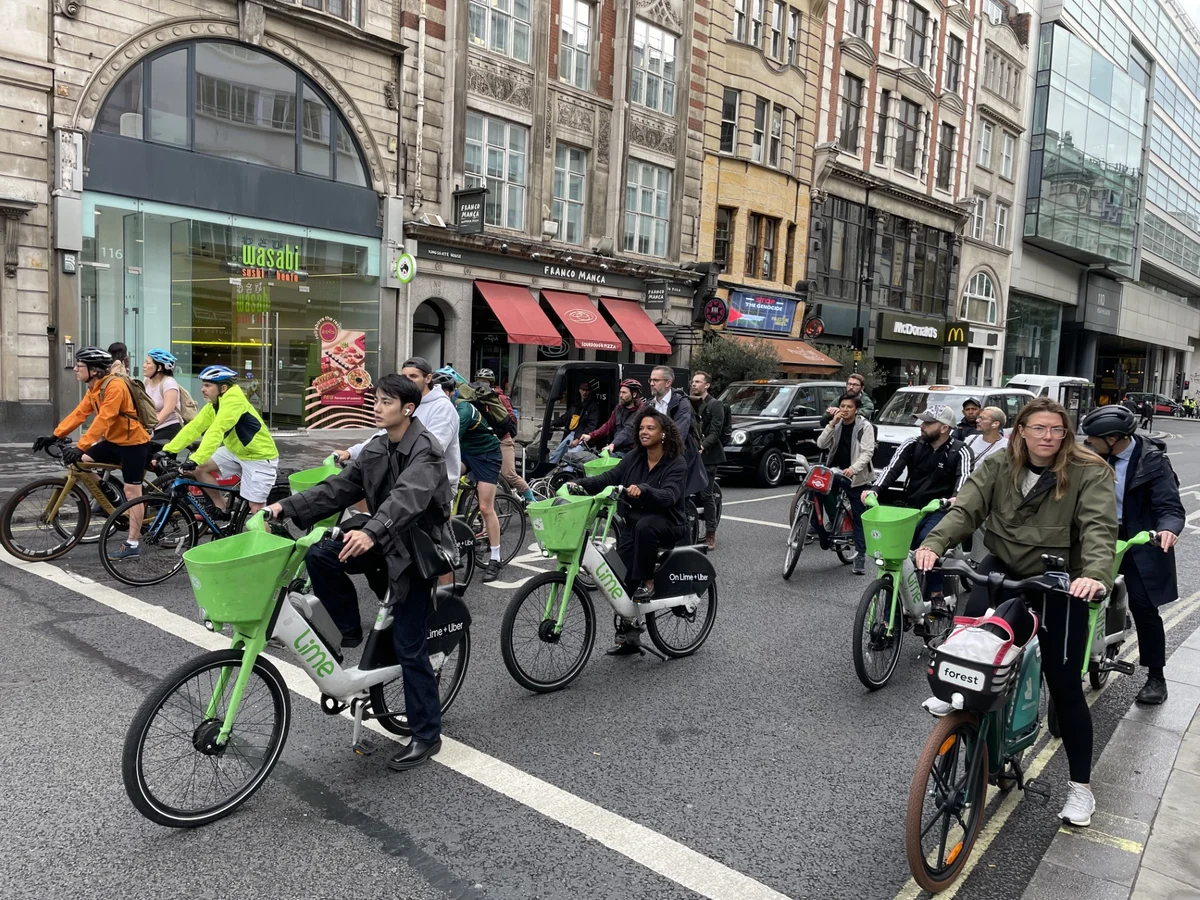Lime bikes chief executive reveals huge expansion vision: ‘We want to be in every borough in London’
By Ross Lydall
Copyright standard

Lime wants to have its e-bikes available in all 33 London boroughs, its chief executive has revealed.
Wayne Ting told The Standard that he wanted the battery-powered bikes – which saw record usage during the recent Tube strike – available for hire in all parts of Greater London.
At present, Lime operates in 17 boroughs after losing the right to operate in Hounslow – though efforts are underway to lift the “geo-fencing” restrictions that prevent the bikes being ridden through the west London borough.
Many Lime bike users have complained that the bikes stop operating at the Hounslow border – while other Londoners want them in their home boroughs.
Asked about Lime’s hope of expanding into other boroughs, and a petition calling for Lime to be allowed to operate in Waltham Forest, Mr Ting said: “We would love to serve every borough in London.
“One of the things that really amazes me is that Lime works across the UK.
“The reason why somebody may want to use Lime in the City of London is the same reason they want to use Lime in the outer boroughs – they want fast, affordable, green transportation.
“When there are opportunities to expand Lime into outer boroughs in Greater London, we are absolutely excited and eager to work with the councils to make that happen.”
Lime has announced that, in partnership with some London councils, it has part-funded 930 additional bike parking bays since January, at a cost of £760,000.
This has delivered a 40 per cent increase in bike parking – bringing the total across the capital that it has helped to deliver to 3,250 bays.
Now the firm is seeking to strike deals with private firms that own kerbside parking space – with Lime offering to cover all implementation and maintenance costs.
“We have a very compelling argument to local businesses: this is a way to bring more customers to your establishment,” Mr Ting said.
“We think that could also alleviate the overall [bike] parking shortage we see in London. Hopefully it’s a ‘win, win’ because more people come into the store or park near the store.”
He said the “overcrowding and untidiness” seen in some bays was a consequence of there being too few places to park hire bikes.
“There has been a huge growth in popularity of bikes in London but our infrastructure hasn’t kept pace,” he said. “That is super critical – creating enough parking spaces to ensure people can go where they want to go.”
Lime saw unprecedented demand for its bikes during the five-day Tube strike at the start of September. On the morning of the last strike day, there was a 69 per cent increase in the number of trips.
Lime has not revealed how many journeys were undertaken during the strike, nor how many bikes it has in London, though others estimate a fleet of about 30,000 bikes.
Mr Ting said there was “no increase in deployment” of Lime bikes during the Tube strike – and praised the firm’s staff for keeping so many bikes on the road.
“There was so much demand,” he said. “I thought it was a really great example of how bikes and alternative transportation can support a city like London.
“Historically, if you have something as critical as the Tube go down, people can’t get to work. They can’t go to school. They can’t do basic things they need to do to get through the day.
“But a lot more people were still coming to the City. They were able to get to work. We help to increase the resilience of the transportation system.
“Because a lot of people now see bikes as a core part of transportation, they are willing to take a chance on shared cycling during a Tube strike. This is hopefully a model we can see in other cities around the world.”
Mr Ting declined to comment on the political ramifications of hire bikes becoming “strike breakers”. He said: “We want to make sure people have an affordable, reliable way to get to school, to get to work.
“As the CEO of Lime, what I’m most proud of was that [during the Tube strike] it was a very taxing week for our operations.
“We saw a greater than 50 per cent increase in demand in trips. That means that more bikes could be broken, more battery swaps [were needed]. Not everything was perfect, but the system largely held, and we were able to serve residents throughout the week, even with the elevated demand.”
Asked whether the Tube strike was good for Lime in terms of its revenue, he said: “It was a record ridership week for us in London.”
Lime has introduced AI technology that authenticates videos uploaded by riders at the end of their trip, ensuring they have parked their bike in an acceptable location.
Lime is also piloting an incentive that offers riders free minutes when they start a ride on a bike that is badly parked or is in an overcrowded parking bay.
The firm has 400 on-street staff that move bikes from overcrowded bays and those blocking pavements after being parked inconsiderately.
Mr Ting said there had been a 60 per cent reduction in overcrowding since January.
He said: “Is the bike parked in a way that is respectful to other people on the streets? That technology helps us get to any problem on the streets faster.”
The shortage of parking bays is “one of the constraints” on Lime’s expansion plans in London. The other is the need for more “good protected bike lanes”.
Mr Ting said: “If you can’t start [your journey] where you want to start and go where you want to go, and be protected on that route, it becomes harder to see greater adoption.
“The mayor, Sir Sadiq Khan, has done a wonderful job in improving the bike lanes and infrastructure. But, given the popularity and explosive growth we are seeing of cycling in the city, we are still not keeping pace with how quickly cycling has grown as a transportation mode here in London.
“We need to continue to invest in more bike lanes and more parking to keep pace with the transition we are seeing on the streets.”
He said the problems caused by the loss of the operating contract in Hounslow showed the need for Londonwide rather than borough by borough regulations.
Lime, which has been in London for seven years, has recently signed a memorandum of understanding with Greenwich council. In Wandsworth, the council has threatened to impound abandoned hire bikes.
Mr Ting admitted controversies over badly-parked bikes was going to be a “forever conversation”, despite Lime having made a “concerted effort” over the last eight months to improve and respond to complaints.
“This is going to be a forever conversation – I think there is always going to be new complaints, new challenges,” he said. “Our job is to continue to raise our own bar so we are a great partner to London.
“If we don’t deliver on that, we are not going to see other boroughs sign up. We are not perfect but, from talking to London residents, they see the efforts we have made to increase the tidiness of our operations.”



